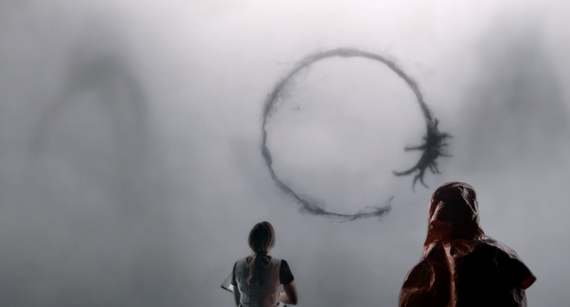The election of Donald Trump to the US presidency makes about as much sense to the majority of Americans as the Heptapod language in the movie Arrival.
In fact, my first thought sitting in the theater watching the end credits roll was, "How is it possible that a message this advanced, this numinous, this open-minded, exists in the same universe as a Donald Trump presidency?"
And then I realized the movie itself provides the answer.
Like most first contact films, the tension in Arrival is an equal mix watching human terror facing the unknown "other" in the shape of an alien life form and terror that the trigger-happy military will do something stupid and get us into a show-down with space-faring beings who will whip the crap out of us--destroying forever the opportunity to be friends with a species way smarter (and likely more benevolent) than us.
Arrival pits curiosity against fear, intelligence against violence, and possibilities against endings. Linguistics professor, Louise Banks, called in to decipher the aliens' language, wants to reach out and discover what the other has to say and offer. Colonel Weber, who is there to preserve and protect America, would rather "shoot first, ask questions later."
The major subtext of Arrival is about human conflict. When will Earth humans finally learn to talk and get along? When are we going to resolve the struggle between love (exemplified by the open mind and open hand) versus fear (the closed-mind/closed fist)? Where do these opposing human viewpoints come from? What can we do to resolve them?
Governments don't ask these kinds of questions. They should. But they don't. Political leaders and the military are not interested in understanding the root of our ills. Doing so would put them out of business.
Movie-makers, artists, philosophers, writers, humanitarians, and psychologists--thoughtful people--ask these questions. I have asked these questions. And this is what I've come up with:
•The open mind (open hand) reflects an ego that has begun the journey of self-reflection and inquiry. This kind of person questions themselves and their learned opinions, adopts other viewpoints and learns their validity (or lack thereof). As they explore, their ego structure becomes more flexible and permeable.
•The more secure the ego the less fearful it is, the fewer boundaries and walls it hides behind and erects.
•The more insecure the ego, the more it needs structure and walls (physical and mental) to feel safe. It clings to and reacts from automatic programs learned in infancy and childhood.
And what is the first major program we unconsciously learn as infants?
There is self and there is other.
It's totally unconscious--but the first moment we reach out for the breast or bottle we crave, our body's senses tell us we are isolated stand-lone units that must struggle in a physical world to get what we need. Our eyes and ears, skin and brain inform us we're separate from others. Experience then confirms it.
The foundational program of the human ego is the unconscious belief in separation. When we cling to the unconscious belief that nothing connects us with life and others, we become more isolated. The more isolated we become the scarier the world gets, the more convinced we are that we must defend ourselves and fight for survival.
Trump's election, the UK June vote on Brexit, and France's upcoming elections where far right National Front Party leader Marine Le Pen is proving a serious contender, are all examples of the closed-mind/closed fist approach to life and governance that insecure egos mired in infantile unconscious fears of separation create.
Decades of progressive thinking and legislation are going up in smoke. Why? Because progressives forgot about the existence of the others--the hundreds of millions of people seething in pain, fear and suspicion as doors were opened, information flowed, cooperation was reached, and borders were dissolved.
The structure their egos depended on--order, authoritarian righteousness, absolute answers, the comfort of the closed fist, the perceived strength of inflexibility, the rigidity of boundaries against outside influences--had to be restored.
Donald Trump is their perfect answer. He is one of them.
In our progressive pride we also forgot we still don't have a clue about who we really are, how the ego is developed and programmed, and why humans are still at each other's throats in the first place.
Self-inquiry is the key. Humanity is doomed without self-knowledge. We have to work to get information about the nature of the human ego into school curriculums; have to work with Congressmen like Tim Ryan and initiate programs in mindfulness and meditation. We have to encourage the exploration of consciousness and the human mind.
"The unexamined life is not worth living," said Socrates.
But, then, what else would an open-minded ego say?
